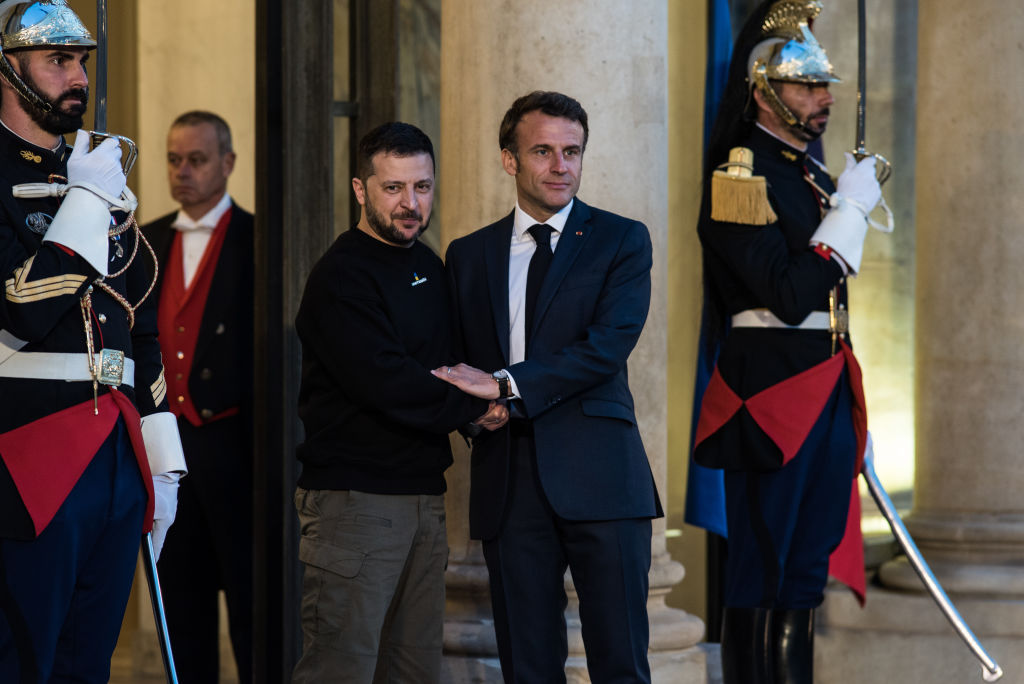French President Emmanuel Macron once warned that letting Ukraine into NATO would be seen as “confrontational” by Russia. But lately he has changed his tune, backing Ukraine’s bid for membership as a means of bringing the war in Ukraine to an early end. Confused? Sometimes, the most cynical explanation is the right one.
The news of detailed discussions at the Elysée about Ukraine’s path to membership came just three weeks after Macron’s trip to Bratislava, Slovakia. During the trip, he extended an olive branch to Russia hawks from NATO’s eastern front—recognizing that they were right about Russia while musing about the need for effective security guarantees for Ukraine.
Macron is substantively correct in making the case for Ukraine’s membership. However, that does not mean that he is sincere and determined to push the enlargement agenda forward. The NATO summit in Vilnius, Lithuania, will be illuminating.
Macron’s sudden enthusiasm for Ukraine’s place in NATO should be read against the background of the Biden administration carefully managing expectations about the embattled country’s future in the alliance. There appear to be different views within its highest levels. Secretary of State Antony Blinken, for example, seems enthusiastic about the prospect of Ukrainian membership. Meanwhile, national security adviser Jake Sullivan seems less convinced. President Biden’s quips—“we won’t make it easy,” for example—suggest the U.S. is not ready to commit to a binding timeline for Ukraine’s membership.
The Biden administration may be acting in good faith, seeking as always to maintain NATO’s unity. Similarly to previous instances in the course of this war, German Chancellor Olaf Scholz in particular will be grateful for the cover provided by Washington, especially in the light of his country’s veto of Ukraine’s and Georgia’s membership action plan in 2008.
But if the United States stands in the way of Ukraine’s NATO aspirations, then Macron’s recent talk will be just that: talk. It will help him complete his transformation started in Bratislava into an advocate, though less than a fully effective one, of the security interests of Eastern Europe. It will allow him to make a more forceful case for Europe’s autonomy from the United States, which he already alluded to in his Bratislava speech. “We cannot delegate,” he said, “our collective security and our stability to the choices of American voters in the coming years.”
Macron’s vision of European strategic autonomy is not about a pragmatic, intergovernmental, push to strengthen Europe’s defense capabilities. Rather, it is about untethering the European Union from the U.S., in hopes that doing so will amplify France’s power on the continent.
The French president is not particularly shy about his personal aspirations. For one, he wants to be at the table when peace between Ukraine and Russia is being negotiated. He also wants to keep the EU away from the looming conflict between the United States and China over Taiwan—a war in which a number of Central and Eastern European countries, at the very least, would be inclined to take Washington’s side.
There is also the economic and industrial agenda, which seeks to counter U.S. and Chinese dominance in critical sectors by erecting new barriers to trade, investment, and exchange of ideas—even at the cost of damaging the transatlantic partnership. Smaller, more open economies of the EU are not thrilled, but they are more likely to listen if France takes their side on the question of NATO’s eastward expansion.
Macron’s charm offensive is a long shot, but the timing is right. If there is a change in Poland’s government this fall, for example, the future governing coalition will be eager to repair Warsaw’s fraying ties with its Western European partners. In order to do so, it may well acquiesce to the more ambitious parts of Macron’s European agenda. In Slovakia, where Macron spoke at the beginning of this month, anti-American sentiments are rampant and a European alternative to NATO (albeit a largely imaginary one) may look tempting.
The relationship between Macron and Hungary’s prime minister for life, Viktor Orbán, himself a critic of the United States, is another one to watch. The two may sit on opposite ideological poles on many questions, but they also seem to have developed an odd affinity, which likely encompasses a rejection of the American-led international order.
The Biden administration can block Macron’s European power play with ease. All it needs to do is to deliver the goods at the Vilnius summit, forcing Paris to follow through with its promise to Ukraine. Don’t hold your breath.






Please note that we at The Dispatch hold ourselves, our work, and our commenters to a higher standard than other places on the internet. We welcome comments that foster genuine debate or discussion—including comments critical of us or our work—but responses that include ad hominem attacks on fellow Dispatch members or are intended to stoke fear and anger may be moderated.
With your membership, you only have the ability to comment on The Morning Dispatch articles. Consider upgrading to join the conversation everywhere.